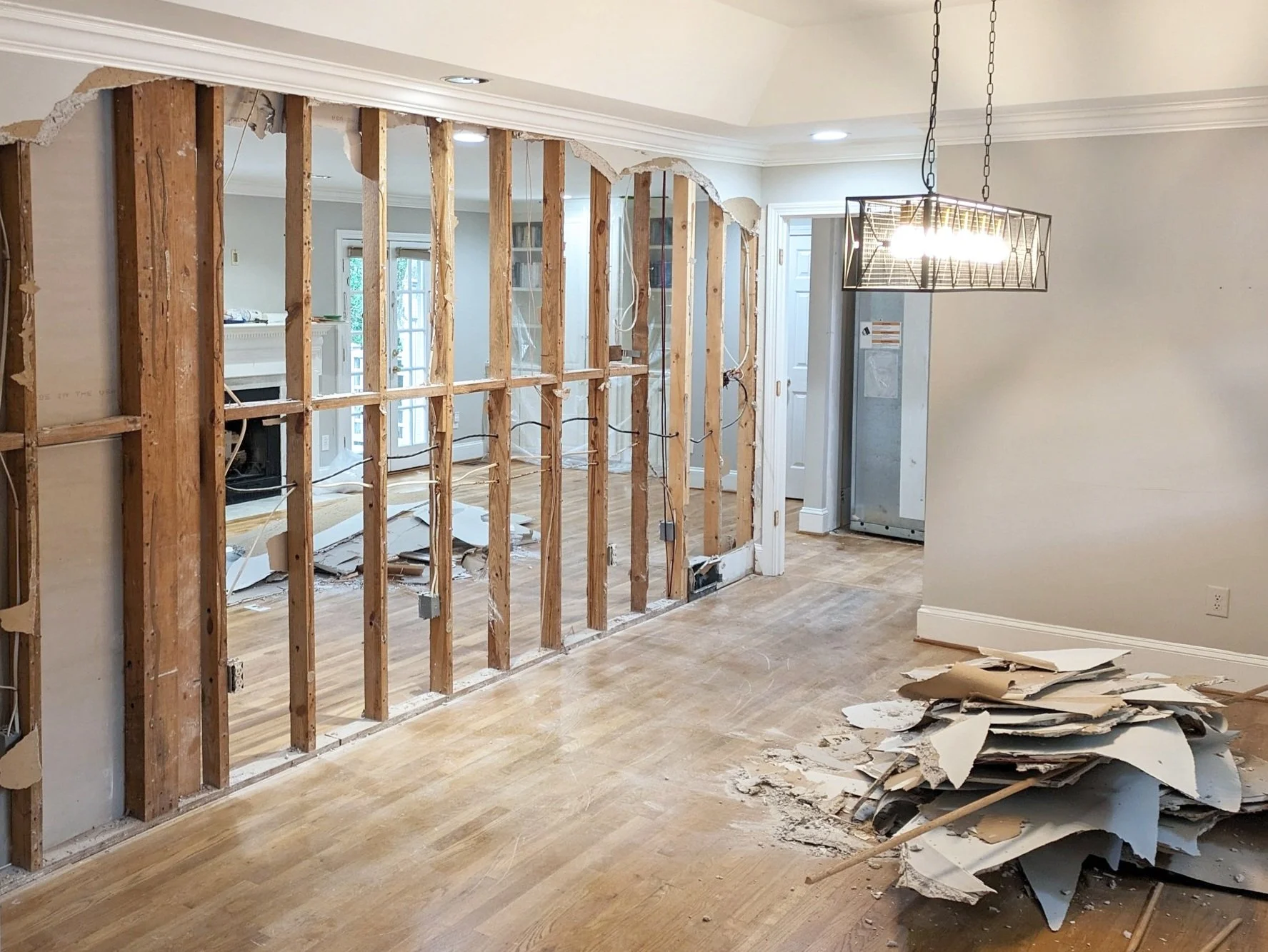The Process of Removing a Load-Bearing Wall:
Step-by-Step Guide
Understanding the Intricacies of Load-Bearing Wall Removals
Learn about the critical aspects and detailed steps to safely remove a load-bearing wall. This guide provides essential insights for homeowners and contractors embarking on this complex task.
Assessment and Planning
Initial Steps for a Safe and Compliant Project
The initial phase of removing a load-bearing wall involves crucial preparatory steps:
Structural Assessment: A detailed assessment by an expert in structural transformations, like load-bearing wall removals and support beam installation, is indispensable. This professional evaluation determines if the wall is indeed load-bearing and assesses the impact of its removal.
Obtaining Necessary Permits: Securing the required permits is a critical legal step. This ensures the project adheres to local building regulations and safety standards.
Creating a Detailed Project Blueprint: A comprehensive plan is formulated, outlining every step of the process. This plan serves as a guide to ensure that the work progresses in compliance with building codes and safety protocols.
These preparatory steps are foundational to ensuring the project's safety, legality, and success.
Preparing for Removal
Laying the Groundwork for Structural Change
Effective preparation prior to load-bearing wall removal is key to ensuring the safe and successful removal of a load-bearing wall:
Rerouting Utilities: Essential utilities like electrical wiring and plumbing are carefully rerouted to avoid disruption and potential hazards during the removal process.
Installing Temporary Supports: To maintain the structural integrity of the building, temporary supports are strategically placed to bear the load that was supported by the wallmoved.
Site Preparation: The work area is prepared to ensure safe access for the construction work, with measures taken to minimize dust and debris, protecting the rest of the home and its occupants.
These preparatory steps are crucial for a smooth transition to the actual removal process, safeguarding the structure and the people involved.
The Wall Removal Process
Executing the Removal with Precision
The removal of a load-bearing wall is a meticulous process that requires precision and expertise:
Careful Dismantling: The process begins with carefully dismantling the wall, section by section and installing temporary supports. This systematic approach helps minimize the impact on the surrounding structure and maintain safety.
Installation of Support Structures: Concurrently, new support structures like beams are installed. These are critical in redistributing the load previously supported by the wall, ensuring the building's structural integrity is maintained throughout the process.
Continuous Monitoring: Constant monitoring is performed throughout the removal to ensure that the load distribution and structure remain stable.
This careful and precise approach to removal is essential for the safe and successful completion of the project, transforming the space while ensuring the building's safety and integrity.
Watch the skilled Heide Contracting team safely and meticulously remove two load-bearing walls and install several beams to support the structure. The process begins with carefully dismantling the wall and installing temporary supports. Then, new support structures like beams are installed. All while, the team is constantly monitoring to ensure that the load distribution and structure remain stable.
Post-Removal Considerations
Final Touches for Integrity and Appeal
After the successful removal of a load-bearing wall, attention shifts to ensuring the structural integrity and aesthetic appeal of the newly created space:
Structural Inspection: A thorough inspection by a qualified professional is essential to confirm the stability and safety of the new structure.
Drywall Installation and Repairs: The installation of new drywall and necessary repairs are undertaken to blend the renovated area seamlessly with the existing spaces.
Aesthetic Enhancements: Finishing touches, including painting, trim installation, and flooring adjustments, are made to ensure the renovated space is not only structurally sound but also visually appealing.
These post-removal steps are crucial for fully realizing the vision of an open and inviting living area, ensuring the renovation enhances both the functionality and beauty of the home.
Interior Wall Removal

Completion of a Load-Bearing Wall Removal: An image showcasing a completed load-bearing wall and column removal project.

Interior Wall Demolition and Beam Installation: An image showing the controlled demolition of two interior walls, and the proper beam installation, emphasizing safety and precision.

Load-Bearing Wall Progression: An image post-removal, with several support beams installed. Preparing to remove final temporary supports and start drywall finishing to match 1960's ceiling. illustrating a load-bearing wall, emphasizing the import

Completion of Load-Bearing Wall Removal: An image of a space after a several load-bearing wall removal, beam installation, final finishing, and restored hardwoods in a 1950's Buckhead home. Prepped for its new kitchen to be effortlessly installed.

Load-Bearing Wall Removal Progression: An image featuring team clean-up post-removal and beam installations, preparing this 1960's ranch home for drywall and hardwood floor restoration for this full-service renovation project.

Post-Wall Removal: An image of previously closed off kitchen, dining, and living space. Highlighting the transformation of removing a wall in an older home to make more functional spaces.
Risks and Safety Measures
Prioritizing Safety and Risk Mitigation
Removing a load-bearing wall is with risks, chief among them being the potential for structural instability. If not done correctly, this can lead to sagging floors, cracked walls, or, in extreme cases, a partial home collapse. To mitigate these risks, professional contractors like Heide Contracting employ several safety measures:
Structural Assessment: A thorough structural assessment is conducted to understand the load distribution and plan for adequate support before removal.
Temporary Supports: Specialized temporary supports are installed to maintain stability during removal.
Skilled Techniques: The team uses precise and controlled methods to dismantle the wall, ensuring minimal impact on the rest of the structure.
Compliance with Building Codes: All work complies with local building codes and regulations, which are crucial for maintaining structural integrity.
Continuous Monitoring: The project is continuously monitored for any signs of structural movement or stress.
By adhering to these strict safety protocols, Heide Contracting ensures that the removal of a load-bearing wall is executed safely, efficiently, and with the least risk to the structural integrity of the building.
Legal and Compliance Aspects
Adhering to Building Codes and Regulations
Adherence to local building regulations and obtaining the necessary permits is critical to any load-bearing wall removal project. These regulations are designed all structural changes to meet safety standards, thereby minimizing potential hazards.
Permit Acquisition: Securing permits from local authorities is essential before starting the project. This step formalizes the project, ensuring it's on record and inspected for compliance.
Building Code Compliance: Each locality has specific building codes that dictate how structural changes should be executed. Professional contractors are well-versed in these codes and ensure their work meets the latest standards.
Inspections and Approvals: Post-removal, inspections by local authorities may be required to certify the safety and integrity of the work performed.
By rigorously following these legal and compliance steps, homeowners and contractors can ensure that the renovation project is safe and legally sound, avoiding future complications or liabilities.
Start Your Renovation Journey with Expert Guidance
Embarking on a structural renovation project, especially one involving the removal of a load-bearing wall, requires expert insight and precision. Don't navigate this complex process alone. Contact our team of seasoned professionals for a comprehensive consultation. We bring the expertise, experience, and meticulous attention to detail your project deserves. Ensure your renovation is aesthetically pleasing, structurally sound, and compliant with all safety standards. Reach out to us today to transform your space with confidence and peace of mind.
Load-Bearing Wall Removal Resources
The Process of Removing a Load-Bearing Wall (current page)






